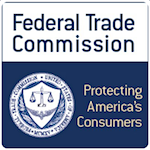The Federal Trade Commission has rapped web marketers for alleged abuses by “influencers” and targeted companies that trick children into making purchases via the web. Wi-Fi health advocates want same disclosure policy at Federal Communications Commission.
Web influencers were told to “clearly and conspicuously disclose their relationships to brands when promoting and endorsing products.”
 |
The same words—“clear and conspicuous”—were applied to Amazon, Apple and Google which were accused of tricking children into making “in-app” purchases on the web that were billed to their parents.
An in-app purchase is one that is made from within a mobile application. They are made in order to access “special content or features in an app such as power-ups, restricted levels, virtual money, special characters, boosts,” says webopedia.com.
Amazon has just agreed to stop fighting the FTC and will pay $70 million to injured parties. Apple had settled for $32.5M, and Google refunded $19M. Davis & Gilbert law firm issued an alert on the recent decision.
Health Advocates Want “Clear and Conspicuous”
Wi-Fi and cellphone health advocates, who have been stymied by an FCC position that electro-magnetic radiation is not harmful unless the body temperature is raised, want consumers to be told “clearly and conspicuously” that computers and cellphones present health problems, both physical and psychological.
Nicholas Kardaras, author of Glow Kids: How Screen Addiction is Hijacking Our Kids, says the public has been “consciously under-informed about the negative effects of too much screen time on children and teenagers even though the research is there.” He has appeared on ABC-TV, Fox & Friends and more than 30 radio stations.
Screens are “visual Trojan Horses that undermine education,” he said.
Cellphone health advocates are buoyed by two items--“60 Minutes” interviewing an ex-Google employee who accuses it of trying to control the minds of cellphone users, and a court decision that allows in-store cellphone warnings.
The CBS show only considered the possible psychological harm to users, avoiding the possible physical harm from pressing cellphones to ears, carrying them anywhere on the body such as shirt or pants pockets, and sleeping near a cordless phone (which is always transmitting).
CNN anchor Anderson Cooper hosted the CBS-TV show April 9 that interviewed ex-google employee Tristan Harris who is touring the country saying that technical experts are using cellphones to “hijack” the minds of users, particularly children.
Court Allows In-Store Postings on Cellphones
The Ninth Circuit Court of Appeals on April 21 found for the city of Berkeley, Calif., which wants retail stores to continue to display instructions on the use of the phones found in the literature for them.
CTIA, representing the wireless industry, had argued that the First Amendment barred the city from forcing cellphone businesses to spread “inaccurate and controversial information.” Health advocates say cautions advised with cellphone use are buried in small type at the end of instruction pamphlets. “They are certainly not ‘clear and conspicuous,’” said a health advocate.
The Court said that if it were to adopt CTIA’s “radical view of the First Amendment,” the Court “would subject a range of ordinary, and heretofore unquestioned, federal, state and local regulatory programs to heightened scrutiny—thereby rendering them presumptively unconstitutional…”
Advocates for cellphone warnings say they expect the CTIA to appeal. Berkeley is represented by Harvard Professor Lawrence Lessig and CTIA by Gibson Dunn & Crutcher.
People’s Minds “Hijacked”
Harris, while employed as a Google product manager, authored a 144-page presentation three years ago that said the distractions of apps are “weakening our relationships to each other” and “destroying our kids’ ability to focus.”
The paper was read by Larry Page, one of the founders, and other co-workers but did not lead to any changes; Harris told Cooper. He then quit the company and founded www.tristanharris.com He travels the country saying that tech companies need to change their products so that they make the best use of our time and not just grab our attention, said Cooper.
Harris told Cooper: “So Snapchat’s the most popular messaging service for teenagers. And they invented this feature called ‘streaks,’ which shows the number of days in a row that you’ve sent a message back and forth with someone.
“So now you could say, ‘Well, what’s the big deal here?’ Well, the problem is that kids feel like, ‘Well, now I don’t want to lose my streak.’ But it turns out that kids actually when they go on vacation are so stressed about their streak that they actually give their password to, like, five other kids to keep their streaks going on their behalf. And so you could ask when these features are being designed, are they designed to most help people live their life? Or are they being designed because they’re best at hooking people into using the product?”
Programmer Brown Interviewed
Ramsay Brown, a computer programmer who operates Dopamine Labs, said programmers can find the best moments to give users a “reward” which triggers the brain to make it want more. The “likes” in Instagram “come in a sudden rush.”
The dopamine molecule in brains aids in the creation of desire and pleasure, Brown told Cooper.
“The longer we look at our screens, the more data companies collect about us,” said Brown. “You’re part of a controlled set of experiments that are happening in real time across you and millions of other people.”
Cooper asked if this means people are “guinea pigs” and Brown agreed. Ad spending on social media has doubled in two years to $31 billion; he told Cooper.


 Lo Isidro, senior director at Real Chemistry with more than a decade of strategic communications and PA experience, has joined Narrative Strategies.
Lo Isidro, senior director at Real Chemistry with more than a decade of strategic communications and PA experience, has joined Narrative Strategies. Nelson Fernandez, former North American chair of APCO Worldwide and managing director of Burson-Marsteller, has joined Volunteers in Medicine Berkshires as director of communications and PA.
Nelson Fernandez, former North American chair of APCO Worldwide and managing director of Burson-Marsteller, has joined Volunteers in Medicine Berkshires as director of communications and PA. Lilit Bargar, who was most recently an EVP in the healthcare practice at Weber Shandwick, comes on board at GCI Health as EVP, corporate practice lead.
Lilit Bargar, who was most recently an EVP in the healthcare practice at Weber Shandwick, comes on board at GCI Health as EVP, corporate practice lead.
 Five ways that successful thought leaders are made.
Five ways that successful thought leaders are made.


 Have a comment? Send it to
Have a comment? Send it to 
No comments have been submitted for this story yet.